Food Rx: Foods to Help Fight Cancer with RealSweet® Onions
Join us for Food Rx with Jessica DeLuise, PA-C, CCMS, a physician assistant and culinary medicine specialist. This monthly series will focus on the important role food plays in our overall health, plus we’ll be sharing kid-friendly recipes to add more fresh produce to your family’s diet. Tune into the Produce for Kids Instagram channel on the first Sunday of each month at 12pm ET for our monthly Live segment!
In this month’s Food Rx, we are talking about one of the scariest “C” words – CANCER. It’s October, which means it’s Breast Cancer Awareness month. There are a variety of factors that influence cancer risk which include lifestyle, exposures to carcinogenic chemicals, genetics, and even the foods we do and don’t eat!
Of course, as this is Food Rx, we are going to focus on food. By creating habits to include nutrient-dense foods as children, kids can carry those habits and food relationships through their adulthood. Additionally, many of the foods listed below support immune system function and promote overall wellness.
These foods are pretty common and easily found at almost every grocery store; the good news is most kids and adults are already eating some or most of these items! So, try them out and scroll all the way down to check out recipe ideas. And be aware, everyone is different and there is no “one size” that fits everyone’s health needs. So, in order to get to know which foods and actions can help you and your family, discuss cancer risk factors with your wellness practitioner.
The Rx
Add more of these cancer-fighting foods to your menu to help reduce your risk of cancer.
10 Foods that can Help REDUCE Cancer Risk:
- Onions – Onions are part of the allium family of produce along with leeks, chives, and about 100 others. Onion consumption has strongly been linked to lower risk of colorectal, stomach, and prostate cancers. Another interesting study done with participants in Puerto Rico, assessed incidence among patient with breast cancer and those who eat sofrito, a condiment rich in onions and garlic (see #2). They found an inverse relationship with those who ate sofrito and breast cancer incidence as compared with those who did not eat onions and garlic.
- Garlic – Garlic isn’t just good for keeping the vampires away. Garlic contains antioxidant phytochemicals called allyl sulfides that “seem to intervene in several steps of the cancer process,” says Karen Collins, R.D., C.D.N., nutrition advisor to the American Institute for Cancer Research. A 2007 study in the Journal of Nutrition suggests that these compounds inhibit colon tumor formation and cell growth. Benefits of garlic have been linked to stomach, esophageal, breast, lung and colon health.
- Apples – An apple a day keeps the doctor away could not be truer. Apples contain antioxidant compounds called polyphenols. Polyphenols are plant-based compounds that lower inflammation, lower cardiovascular risk, and can even improve immune system function. Most importantly, some research suggests that polyphenols possess anti-cancer and tumor-fighting properties. One of the polyphenols called PHLORETIN can inhibit growth of certain cancer proteins. One study from 2018 in the Journal of Food and Drug Analysis suggests that apple phloretin significantly inhibits the growth of breast cancer cells, while not affecting normal cells.
- Berries – Berries rich gem-like colors are a function of compounds called ANTHOCYANINS. In one study, blackberry anthocyanins actually showed lower biomarkers for colon cancer. Biomarkers are hormone and levels tested in the serum that are indicative of certain disease processes. Another study showed that blueberries have negative effects on breast cancer risk in mice.
- Cruciferous vegetables –These items include broccoli, cauliflower, kale, and Brussels sprouts. They contain sulforaphane, a plant compound with anticancer properties. It has been shown in studies to stimulate death of colon cancer cells. Another study shows that sulforaphane in combination with genistein, a compound in soybeans, can significantly inhibit breast cancer tumor development and size. Sulforaphane also inhibits an enzyme linked to cancer development. One review recommends 3 to 5 servings of cruciferous vegetables per week for the best cancer-preventive effects.
- Carrots – Carrots, along with sweet potatoes and butternut squash, have beta-carotene and Vitamin C, giving these items their bright orange color. Beta carotene has been investigated in numerous studies and shows links to a reduction in the risk of breast and prostate cancer. Another analysis shows that higher consumption of carrots results in a 26 percent lower risk of developing stomach cancer.
- Omega-3 Fatty Acids –These poly-unsaturated fats come from fatty fish (salmon, mackerel, halibut, cod, sardines, anchovies), walnuts, hemp seeds, tofu, chia seeds, flaxseeds, grass-fed beef and free-range eggs. One study showed that individuals who had diets rich in freshwater fish had a 53% reduction in colorectal cancer. And, don’t worry if you are older and just starting to add Omega3s into your diet because there was a study that showed adding cod liver oil into diets later in life lowers prostate cancer risk. Finally, a study following 68,109 people found that people who consumed fish oil supplements at least four times a week were 63% less likely to develop colon cancer than those who did not.
- Tomatoes –Tomatoes are rich in lycopene, an antioxidant that gives them their bright red color. Lycopene is more bioavailable, or easily absorbed, when tomatoes are cooked. Lycopene helps fight skin cancer, and possible breast, lung, endometrial, and prostate cancer.
- Flaxseeds – Flaxseed contains antioxidants called lignans. Lignans play an important role by helping the body rid itself of carcinogens that may cause cancer. They also contain Omega-3 fatty acids, which reduce inflammation and support the immune system. Be sure to eat GROUND flax to get all of the benefits.
- Leafy Greens –While these items may not be your or your kids favorite, they are as valuable as emeralds! Leafy greens are rich in carotenoid antioxidants (see #6) and a vitamin called folate. Folate is needed for development of red blood cell development, DNA replications, and our body’s detoxification pathways.
Tips for Keeping All of the Cancer Fighting Foods On-Hand and in Your Body!
- Plan your meals ahead of time and get creative on ways to incorporate veggies. Some ideas are:
- Adding pureed veggies to marinara sauces
- Bread and bake veggies alongside chicken tenders. Check out my recipe from the August FoodRx.
- Make tacos and have veggies set out in varying colors for kids to load onto their dish. Make it a game by seeing how many colors they can use with each taco they eat.
- Shred or puree them and add into favorite baked recipes. Cut out all or ½ of the oil the recipe calls for as the veggies will add moisture.
- Mix them into chicken, potato, or pasta salads.
- Add greens into a fruit smoothie – spinach, cauliflower, carrots, and pumpkin work really well!
- Fill at least ½ of your plate with fruits and vegetables. This ensures you are eating the very important nutrition and minerals needed for wellness and leaves less room for nutrient-poor items.
- Stock up on the frozen ones! Usually these have similar nutrition to fresh veggies and fruits.
- Choose wild-caught, free-range, pasture-raised, grass-fed/finished, and organic animal products when possible.
- Avoid items known to be linked to cancer risk. This means there is more room for the good stuff!
- Limit or avoid processed meats like hot dogs, bacon and any other meat you find at the deli counter. These are heavily processed and have compounds that cause cancer. This even goes for items that say “nitrate free” or “uncured.”
- Limit charred red meat – Charred red meat has AGEs (Advance Glycolic End Products) which accumulate in the body and cause health issues like cataracts. Thought it remains controversial, these processes are Alzheimer’s, cardiovascular disease, and cancer. Choose lean chicken, fish or plant-based protein.
- Remember, you can’t TOTALLY eliminate your cancer risk, but you can do the best you can!
Pork Chops with Apple-Cherry Jam & Roasted Veggies
Ingredients:
Apple-Cherry Jam:
- 1 green apple, peeled, chopped
- 1 cup pitted cherries
- 1 cup sliced RealSweet® sweet onions
- ¼ cup water
- 1 Tbsp. apple cider vinegar
Roasted Veggies:
- 2 small sweet potatoes, diced
- 1 cup chopped carrots
- 1 cup chopped Brussels sprouts
- 1 clove garlic, minced
- 1 Tbsp. avocado oil
- 1 Tbsp. rosemary, minced
- ½ tsp. pink salt
Pork Chops:
- 2 (4 oz.) grass-fed pork chops
- 4 tsp. avocado oil
- 4 tsp. grainy mustard
Instructions:
- Preheat oven to 425F.
- Add apples, cherries, onions, water and vinegar to small, covered saucepan. Simmer on low for 45 minutes. Remove from heat.
- Meanwhilte, toss sweet potatoes, carrots, Brussels sprouts, garlic, oil, rosemary and salt in large bowl. Spread on baking sheet and bake 15 minutes. Remove pan from oven and push veggies to side to make room for pork chops. Add pork chops and brush with oil and mustard. Place baking sheet back in oven and bake additional 15-20 minutes, or until pork chops reach an internal temperature of 165F and veggies are tender.
- Serve pork chops topped chutney and alongside veggies and a side salad.
Resources:
- https://www.medicalnewstoday.com/articles/324193.php
- https://www.mdanderson.org/publications/focused-on-health/36-foods-that-can-help-lower-your-cancer-risk.h12-1592991.html
- https://www.everydayhealth.com/cancer/10-foods-help-fight-cancer/
- https://www.medicalnewstoday.com/articles/326433.php
- https://www.berkeleywellness.com/healthy-eating/food-safety/article/abcs-ages-advanced-glycation-end-products
Disclaimer: Before making any health or diet changes, please consult your doctor. The information shared in this episode is meant to be informative but not replace medical advice from your doctor.

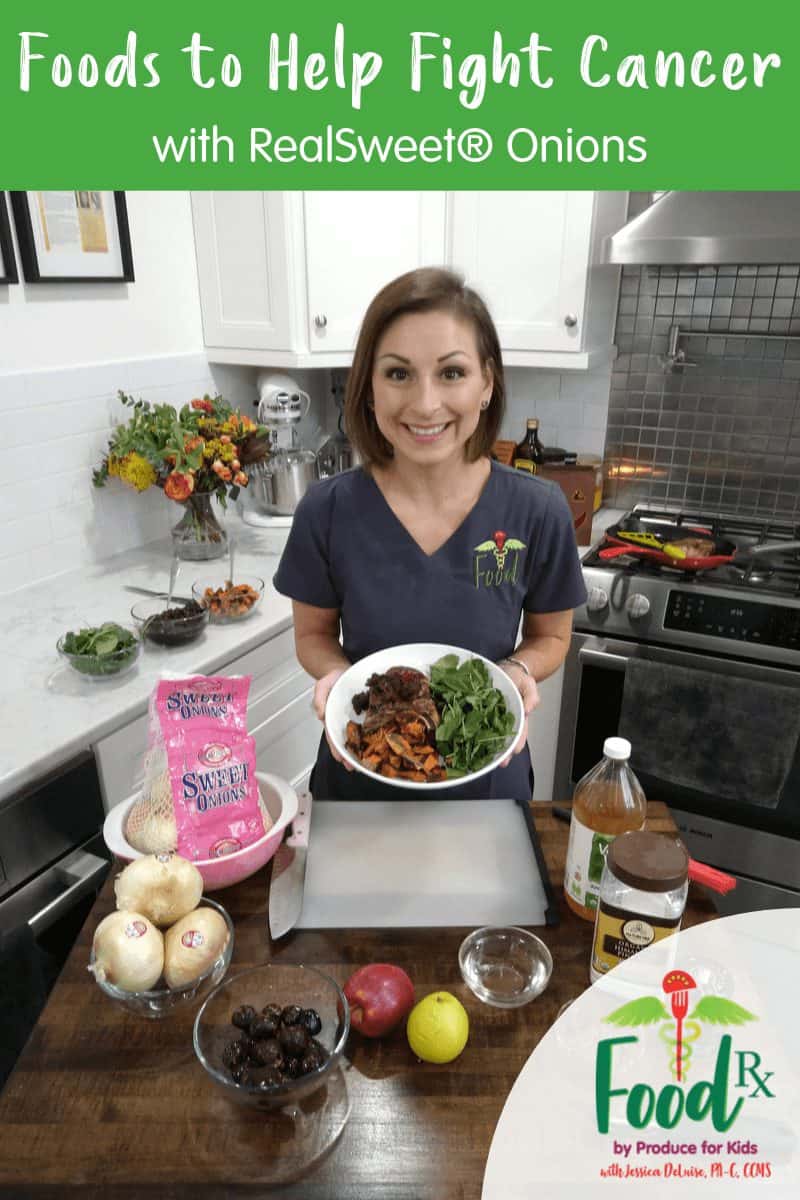
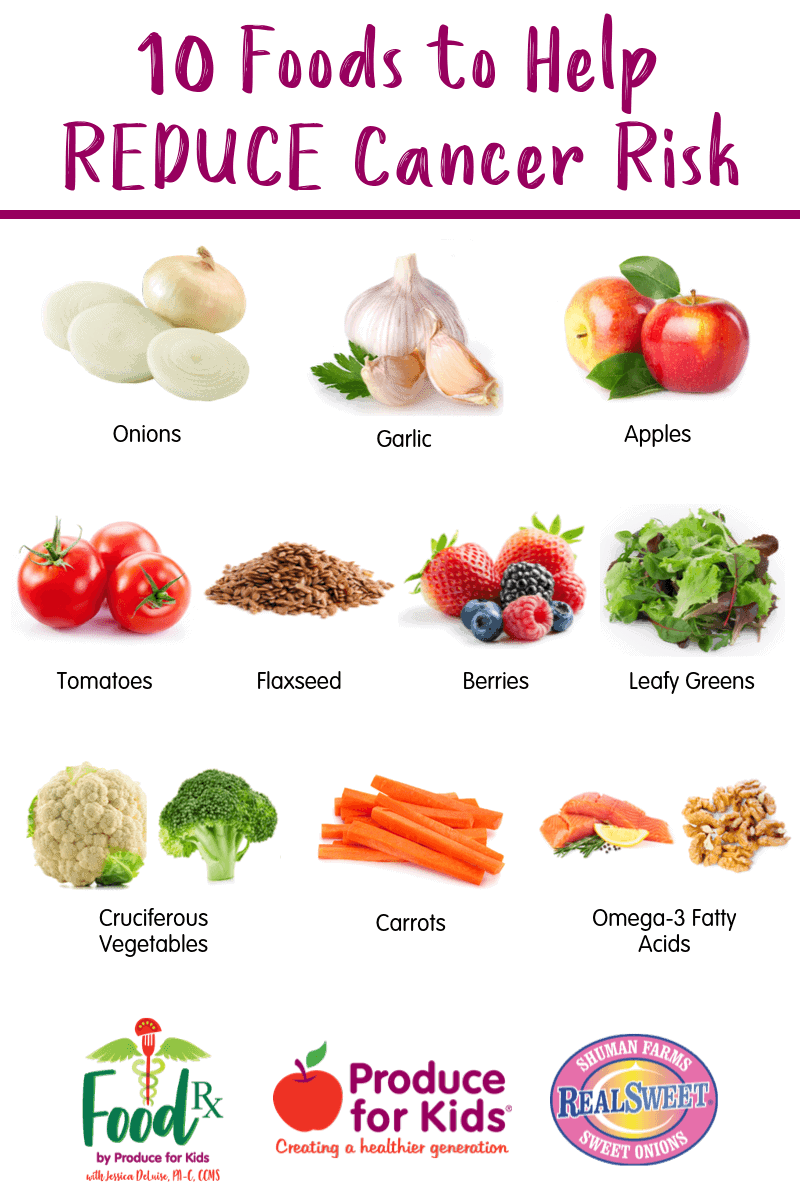
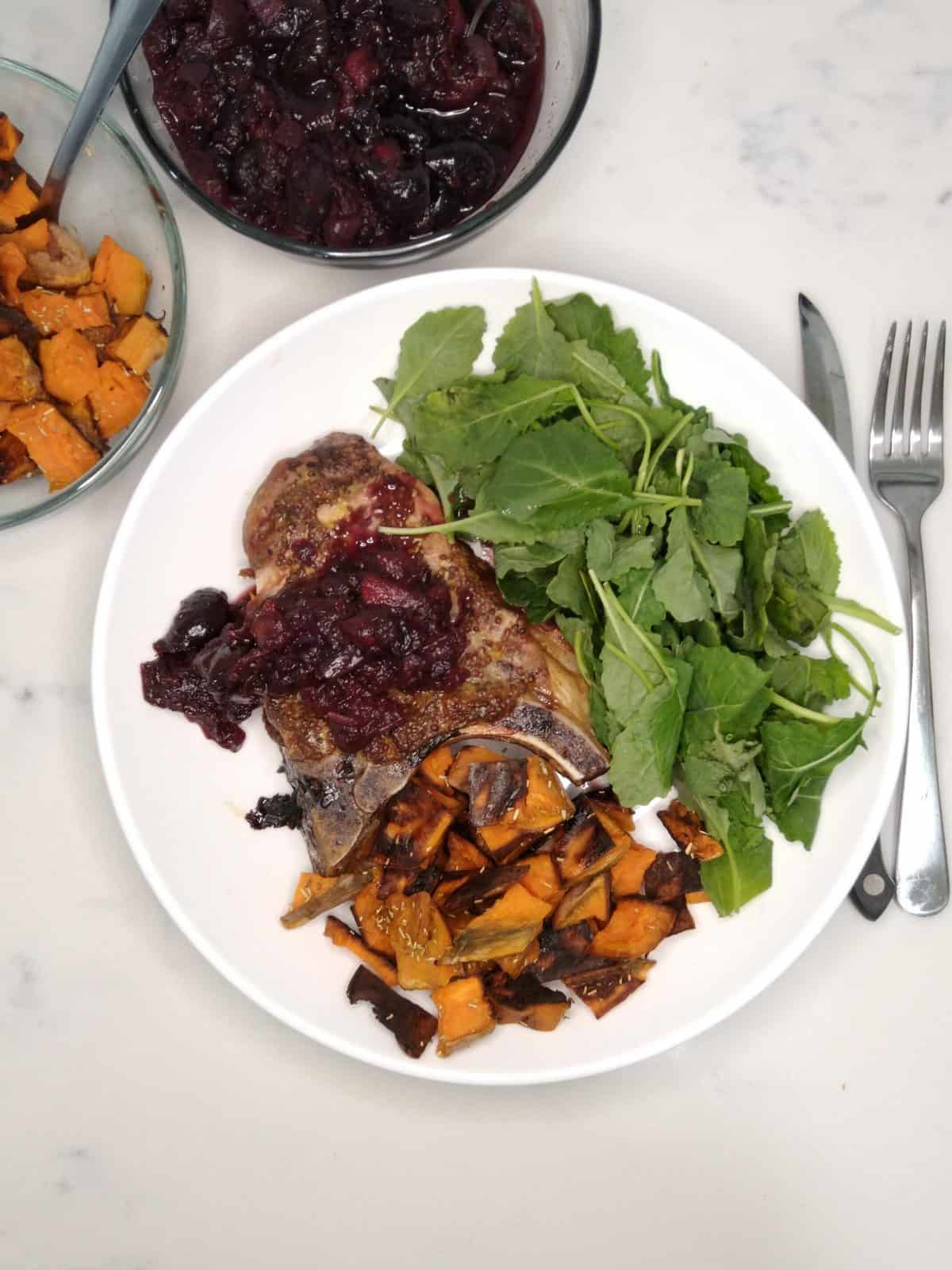
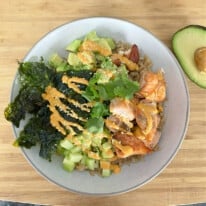



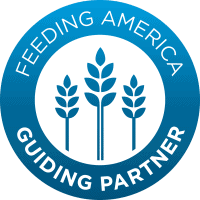
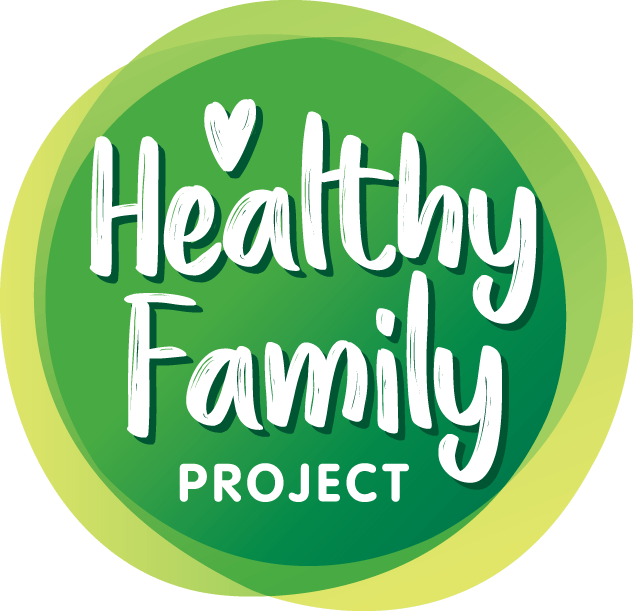
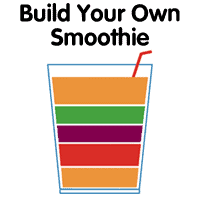
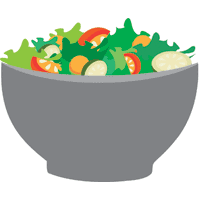
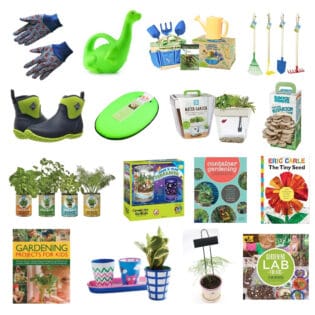


We should be aware of the important points in this article about this foods to help fight cancer with real sweet onions. This would really mean a lot. Thanks for sharing this one out.